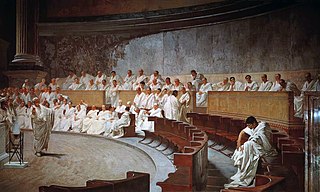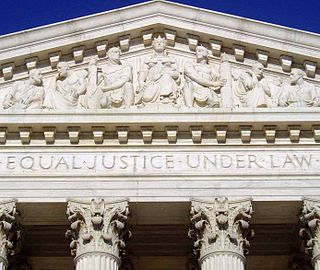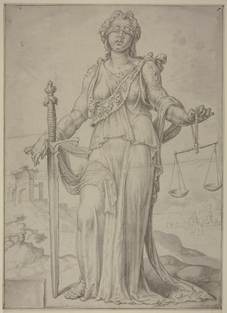 W
WJurisprudence, or legal theory, is the theoretical study of law. Scholars of jurisprudence seek to explain the nature of law in its most general form and provide a deeper understanding of legal reasoning and analogy, legal systems, legal institutions, and the role of law in society.
 W
WPhilosophy of law is a branch of philosophy that examines the nature of law and law's relationship to other systems of norms, especially ethics and political philosophy. It asks questions like "What is law?", "What are the criteria for legal validity?", and "What is the relationship between law and morality?" Philosophy of law and jurisprudence are often used interchangeably, though jurisprudence sometimes encompasses forms of reasoning that fit into economics or sociology.
 W
WAuctoritas is a Latin word which is the origin of English "authority". While historically its use in English was restricted to discussions of the political history of Rome, the beginning of phenomenological philosophy in the 20th century expanded the use of the word.
 W
WIn the fields of sociology and political science, authority is the legitimate power that a person or a group of persons possess and practice over other people. In a civil state, authority is made formal by way of a judicial branch and an executive branch of government.
 W
W"The Case of the Speluncean Explorers" is an article by legal philosopher Lon L. Fuller first published in the Harvard Law Review in 1949. Largely taking the form of a fictional judgment, it presents a legal philosophy puzzle to the reader and five possible solutions in the form of judicial opinions that are attributed to judges sitting on the fictional "Supreme Court of Newgarth" in the year 4300.
 W
WThe Concept of Law is a 1961 book by the legal philosopher HLA Hart and his most famous work.The Concept of Law presents Hart's theory of legal positivism—the view that laws are rules made by humans and that there is no inherent or necessary connection between law and morality—within the framework of analytic philosophy. Hart sought to provide a theory of descriptive sociology and analytical jurisprudence. The book addresses a number of traditional jurisprudential topics such as the nature of law, whether laws are rules, and the relation between law and morality. Hart answers these by placing law into a social context while at the same time leaving the capability for rigorous analysis of legal terms, which in effect "awakened English jurisprudence from its comfortable slumbers".
 W
WLaw's Empire is a 1986 text in legal philosophy by Ronald Dworkin, in which the author continues his criticism of the philosophy of legal positivism as promoted by H.L.A. Hart during the middle to late 20th century. The book notably introduces Dworkin's Judge Hercules as an idealized version of a jurist with extraordinary legal skills who is able to challenge various predominating schools of legal interpretation and legal hermeneutics prominent throughout the 20th century. Judge Hercules is eventually challenged by Judge Hermes, another idealized version of a jurist who is affected by an affinity to respecting historical legal meaning arguments which do not affect Judge Hercules in the same manner. Judge Hermes' theory of legal interpretation is found by Dworkin in the end to be inferior to the approach of Judge Hercules.
 W
WEarth jurisprudence is a philosophy of law and human governance that is based on the fact that humans are only one part of a wider community of beings and that the welfare of each member of that community is dependent on the welfare of the Earth as a whole. It states that human societies will only be viable and flourish if they regulate themselves as part of this wider Earth community and do so in a way that is consistent with the fundamental laws or principles that govern how the universe functions, which is the ‘Great Jurisprudence’.
 W
WElements of the Philosophy of Right is a work by Georg Wilhelm Friedrich Hegel published in 1820, though the book's original title page dates it to 1821. Hegel's most mature statement of his legal, moral, social and political philosophy, it is an expansion upon concepts only briefly dealt with in the Encyclopedia of the Philosophical Sciences, published in 1817. Law provides for Hegel the cornerstone of the modern state. As such, he criticized Karl Ludwig von Haller's The Restoration of the Science of the State, in which the latter claimed that law was superficial, because natural law and the "right of the most powerful" was sufficient (§258). The absence of law characterized for Hegel despotism, whether monarchist or ochlocracist (§278).
 W
WEqual justice under law is a phrase engraved on the West Pediment, above the front entrance of the United States Supreme Court building in Washington D.C. It is also a societal ideal that has influenced the American legal system.
 W
WA Failure of Capitalism: The Crisis of '08 and the Descent into Depression is a 2009 book by the economist Richard Posner. The text was initially published on May 1, 2009 by Harvard University Press. Posner criticizes President George W. Bush and his administration's policies and the response to the fiscal crisis, and moves away from his past well-known advocacy of free-market capitalism. The book has been primarily noted not for his criticism of progressive government policies, but rather his critique of laissez-faire capitalism and its ideologues.
 W
WThe free scientific research is a jusphilosophical school precursor of the jurisprudence of values, which defends basically that, in order to discover the origins of law's principles and rules, the interpreter's studies may have support on various "sciences" such as sociology, economics, linguistics, philosophy and theology, that previous law teachers had not used before.
 W
WGlobal Justice or Global Revenge? International Criminal Justice at the Crossroads (2003) is a book by Austrian philosopher Hans Köchler.
 W
WThe Golden Rule is the principle of treating others as one wants to be treated. It is a maxim that is found in most religions and cultures. It can be considered an ethic of reciprocity in some religions, although different religions treat it differently.
 W
WHuman rights are moral principles or norms for certain standards of human behaviour and are regularly protected in municipal and international law. They are commonly understood as inalienable, fundamental rights "to which a person is inherently entitled simply because she or he is a human being" and which are "inherent in all human beings", regardless of their age, ethnic origin, location, language, religion, ethnicity, or any other status. They are applicable everywhere and at every time in the sense of being universal, and they are egalitarian in the sense of being the same for everyone. They are regarded as requiring empathy and the rule of law and imposing an obligation on persons to respect the human rights of others, and it is generally considered that they should not be taken away except as a result of due process based on specific circumstances.
 W
WInjustice is a quality relating to unfairness or undeserved outcomes. The term may be applied in reference to a particular event or situation, or to a larger status quo. In Western philosophy and jurisprudence, injustice is very commonly—but not always—defined as either the absence or the opposite of justice.
 W
WFrench legal system or Institutional System or Romance System is an institutional system of organization of civil law. The system is in force in France, Belgium, Spain, Albania, Romania and Latin America.
 W
WIusnaturalism is a theory of law, which holds that legal norms follow a human universal knowledge on justice and harmony of relations. Thus, it views enacted laws that contradict such universal knowledge as unjust and illegitimate. Modern theorists considered as iusnaturalists include Hugo Grotius, Immanuel Kant, Gottfried Wilhelm Leibniz, and Franz von Zeiller, among others.
 W
WJustice, in its broadest sense, is the principle that people receive that which they deserve, with the interpretation of what then constitutes "deserving" being impacted upon by numerous fields, with many differing viewpoints and perspectives, including the concepts of moral correctness based on ethics, rationality, law, religion, equity and fairness.
 W
WIn Protestant Christianity, the relationship between Law and Gospel—God's Law and the Gospel of Jesus Christ—is a major topic in Lutheran and Reformed theology. In these religious traditions, the distinction between the doctrines of Law, which demands obedience to God's ethical will, and Gospel, which promises the forgiveness of sins in light of the person and work of Jesus Christ, is critical. Ministers use it as a hermeneutical principle of biblical interpretation and as a guiding principle in homiletics and pastoral care. It involves the supersession of the Old Covenant by the New Covenant and Christian theology.
 W
WLegal Education and the Reproduction of Hierarchy: A Polemic Against the System is an essay by Duncan Kennedy on legal education in the United States of America. The work is a critique of American legal education and argues that legal education reinforces class, race, and gender inequality.
 W
WLegal naturalism is a term coined by Olufemi Taiwo to describe a current in the social philosophy of Karl Marx which can be interpreted as one of natural law. Taiwo considered it the manifestation of Natural Law in a dialectical materialist context. The concept recognizes the existence of legal priorities or principles, which form an intrinsic part of an economic system.
 W
WA metaconstitution is a set of pre-constitutional rules. It is in lieu of a formalized constitution and consists of accepted axiomatic policy. The constitution is similar to or developed from this. A metaconstitution is also less binding, and can be used to a less rigid form of government. To many nations, the metaconstitution provides an "exit-option", where they may variate from the written document. A metaconstitution, unlike formal constitutions, never needs to be written. Its creation results from the morality and judgment of the people. To be formulated, the people must be generally opposed to anarchy and must desire some form of governing force.
 W
WMutual liberty is an idea first developed by Alexis de Tocqueville in his 1835 work Democracy in America. In effect, Tocqueville was referring to the general nature of American society during the 19th century. It appeared to him, at least on the surface, that every citizen in the United States had the opportunity to participate in the civic activities of the country. Another way to look at mutual liberty is by accounting for the collective free wills of every rational being in a community.
 W
WNatural Law and Natural Rights is a book about natural law and natural rights by the philosopher John Finnis. The book was first published by Oxford University Press.
 W
WNaturalization is the legal act or process by which a non-citizen of a country may acquire citizenship or nationality of that country. It may be done automatically by a statute, i.e., without any effort on the part of the individual, or it may involve an application or a motion and approval by legal authorities. The rules of naturalization vary from country to country but typically include a promise to obey and uphold that country's laws, taking and subscribing to an oath of allegiance, and may specify other requirements such as a minimum legal residency and adequate knowledge of the national dominant language or culture. To counter multiple citizenship, most countries require that applicants for naturalization renounce any other citizenship that they currently hold, but whether this renunciation actually causes loss of original citizenship, as seen by the host country and by the original country, will depend on the laws of the countries involved.
 W
WOtium, a Latin abstract term, has a variety of meanings, including leisure time in which a person can enjoy eating, playing, resting, contemplation and academic endeavors. It sometimes, but not always, relates to a time in a person's retirement after previous service to the public or private sector, opposing "active public life". Otium can be a temporary time of leisure, that is sporadic. It can have intellectual, virtuous or immoral implications. It originally had the idea of withdrawing from one's daily business (neg-otium) or affairs to engage in activities that were considered to be artistically valuable or enlightening. It had particular meaning to businessmen, diplomats, philosophers and poets.
 W
WThe political philosophy of Immanuel Kant (1724–1804) favoured a classical republican approach. In Perpetual Peace: A Philosophical Sketch (1795), Kant listed several conditions that he thought necessary for ending wars and creating a lasting peace. They included a world of constitutional republics by establishment of political community. His classical republican theory was extended in Doctrine of Right (1797), the first part of Metaphysics of Morals. At the end of the 20th century Kant's political philosophy had been enjoying a remarkable renaissance in English-speaking countries with more major studies in a few years than had appeared in the preceding many decades.
 W
WPolitical sociology is an interdisciplinary field of study concerned with exploring how power and oppression operate in society across micro to macro levels of analysis. Interested in the social causes and consequences of how power is distributed and changes throughout and amongst societies, political sociology's focus ranges across individual families to the State as sites of social and political conflict and power contestation.
 W
WPositivism is a philosophical theory that holds that all genuine knowledge is either positive—a posteriori and exclusively derived from experience of natural phenomena and their properties and relations—or true by definition, that is, analytic and tautological. Thus, information derived from sensory experience, as interpreted through reason and logic, forms the exclusive source of all certain knowledge.
 W
WThe Chair of Jurisprudence is a Professorship at the University of Glasgow, founded in 1952.
 W
WThe rule of law is defined in the Oxford English Dictionary as "[t]he authority and influence of law in society, especially when viewed as a constraint on individual and institutional behavior; (hence) the principle whereby all members of a society are considered equally subject to publicly disclosed legal codes and processes." The term rule of law is closely related to constitutionalism as well as Rechtsstaat and refers to a political situation, not to any specific legal rule.
 W
WSalus populi suprema lex esto is a maxim or principle found in Cicero's De Legibus.
 W
WSkepticism in law is a school of jurisprudence that was a reaction against the idea of natural law, and a response to the 'formalism' of legal positivists. Legal skepticism is sometimes known as legal realism.
 W
WTorture is the act of deliberately inflicting severe physical or psychological suffering on someone by another as a punishment or in order to fulfill some desire of the torturer or force some action from the victim. Torture, by definition, is a knowing and intentional act; deeds which unknowingly or negligently inflict suffering or pain, without a specific intent to do so, are not typically considered torture.
 W
WTreatise on Law is Thomas Aquinas' major work of legal philosophy. It forms questions 90–108 of the Prima Secundæ of the Summa Theologiæ, Aquinas' masterwork of Scholastic philosophical theology. Along with Aristotelianism, it forms Aquinas' notion of law
 W
W‘Wild law’ refers to human laws consistent with Earth jurisprudence. A wild law regulates human behavior that privileges maintaining the integrity and functioning of the whole Earth community in the long term over the interests of any species at a particular time.